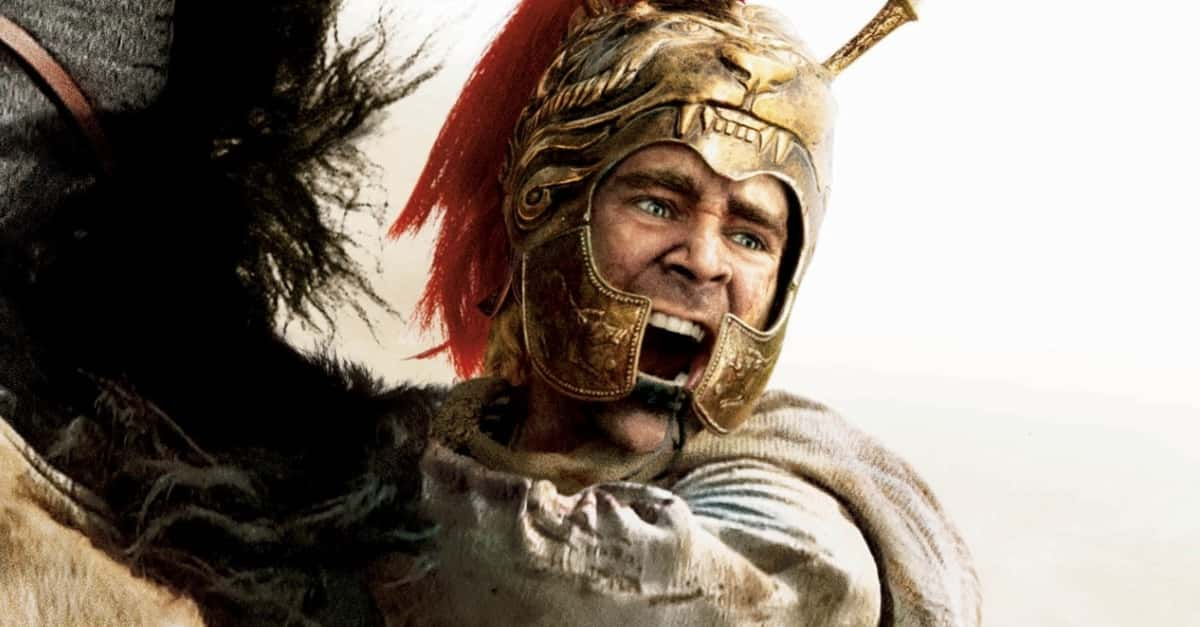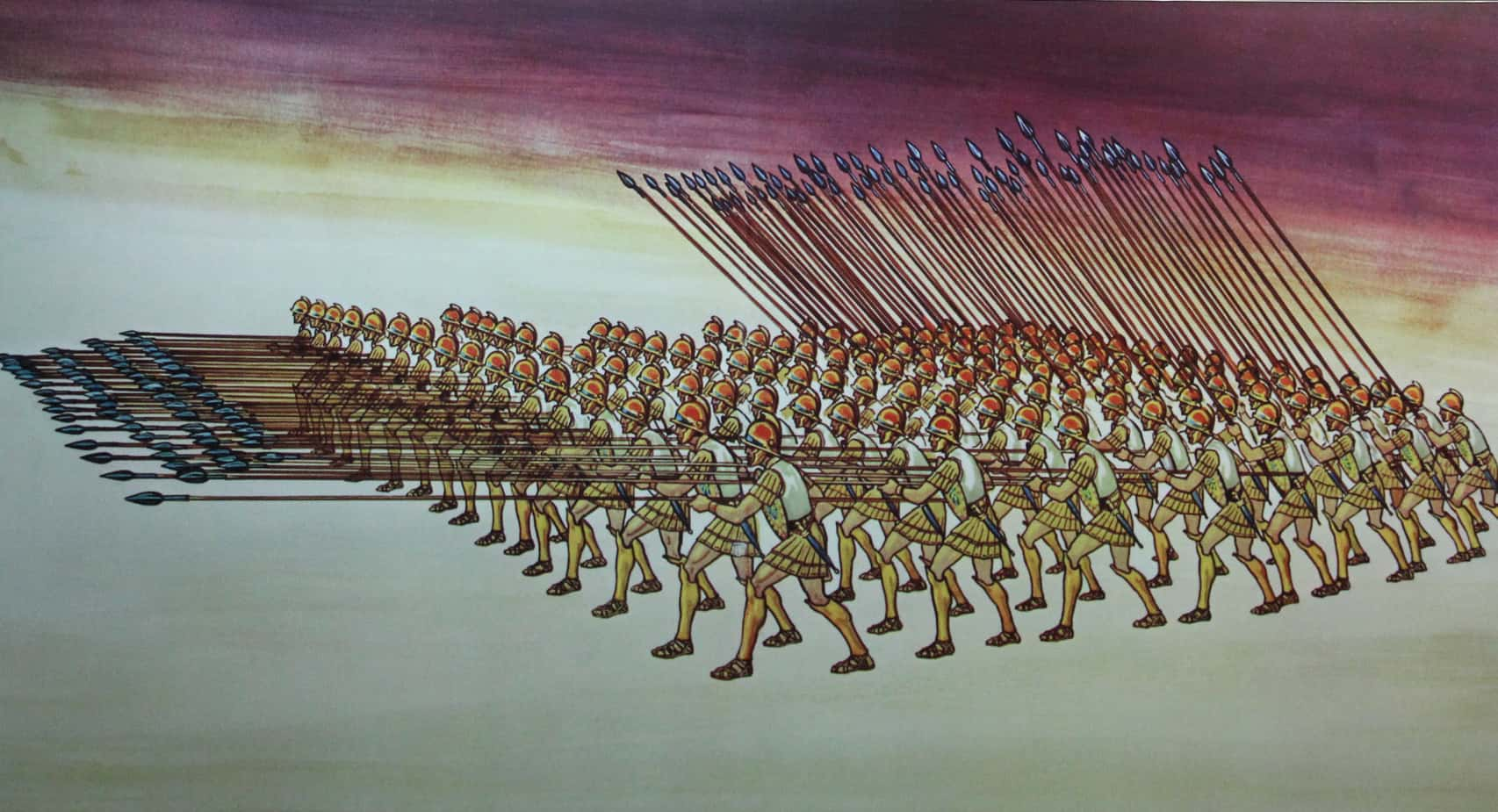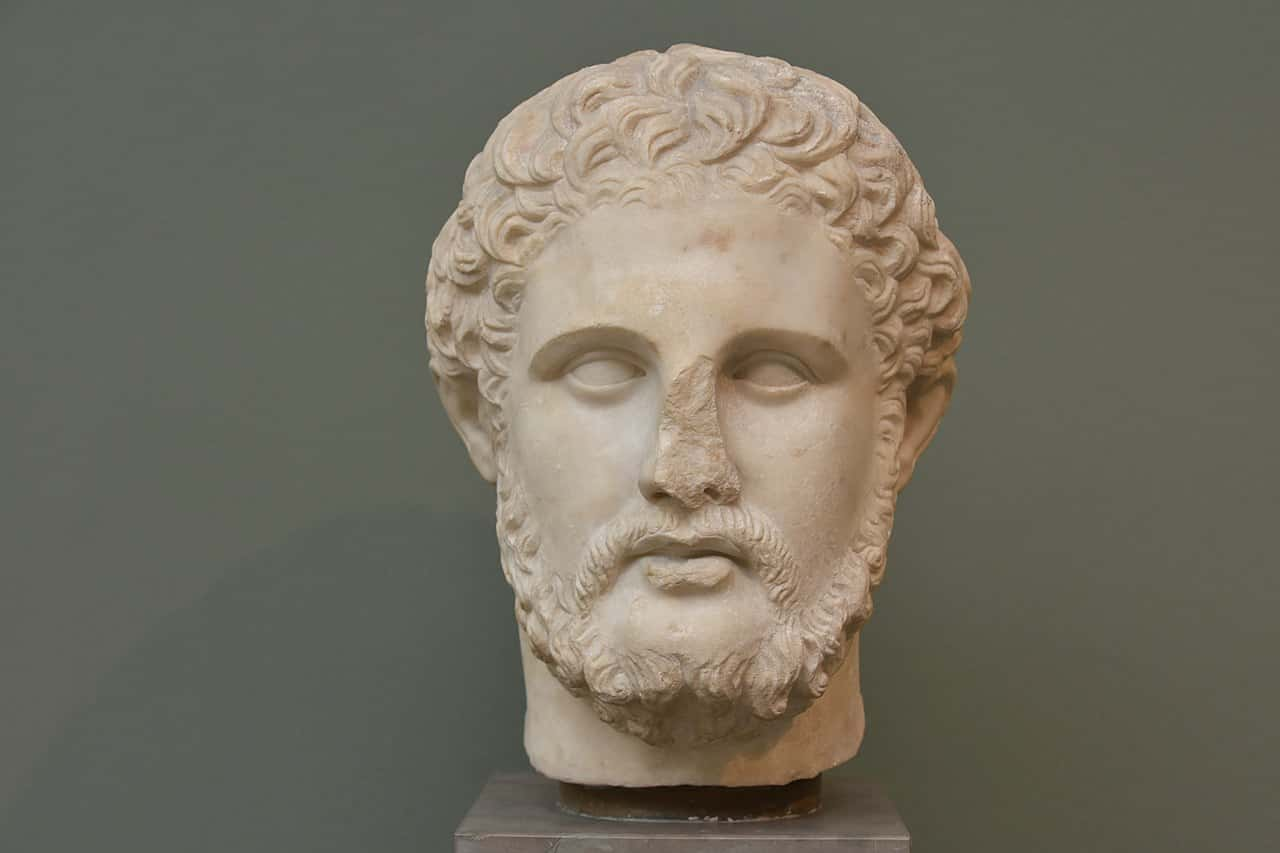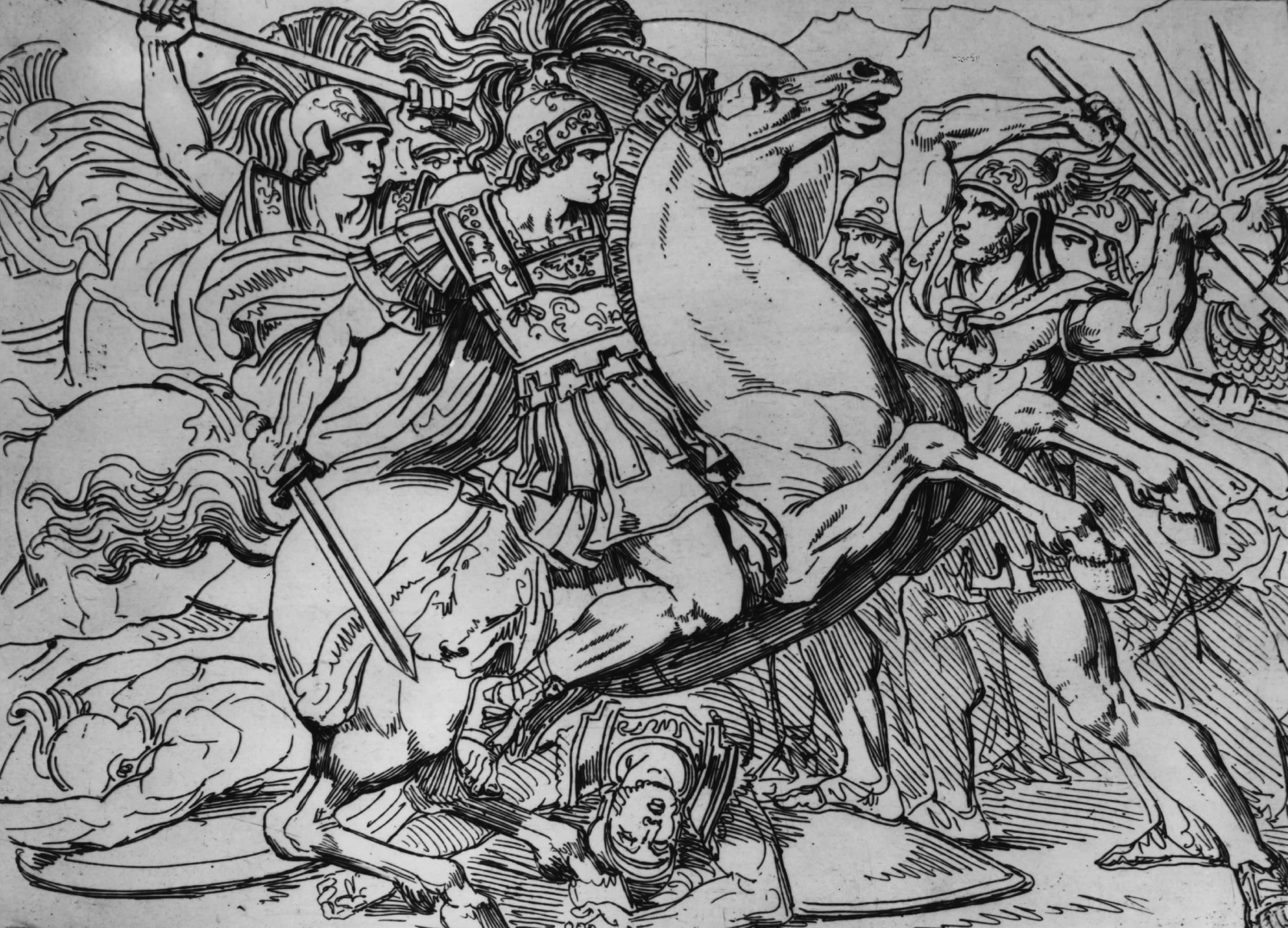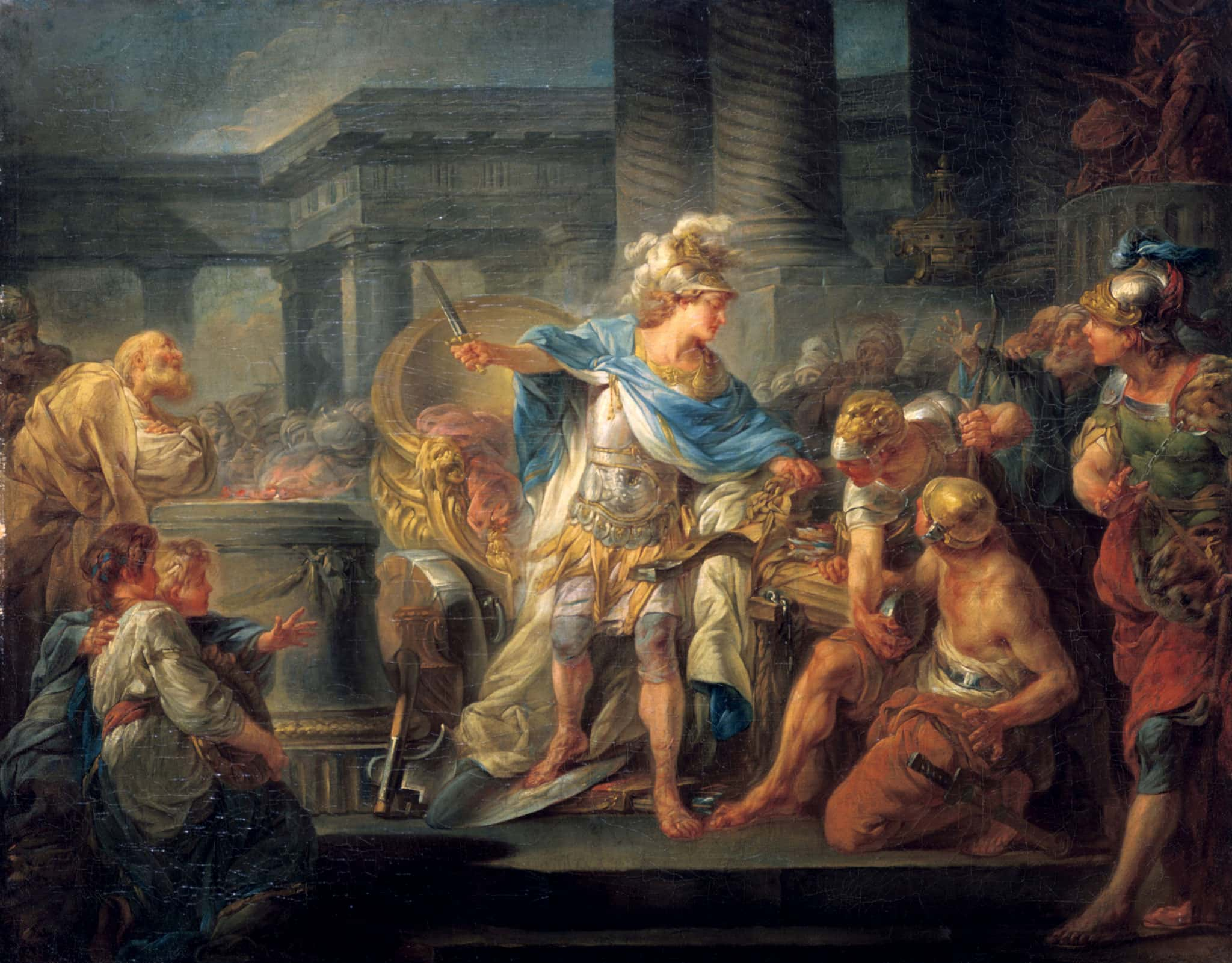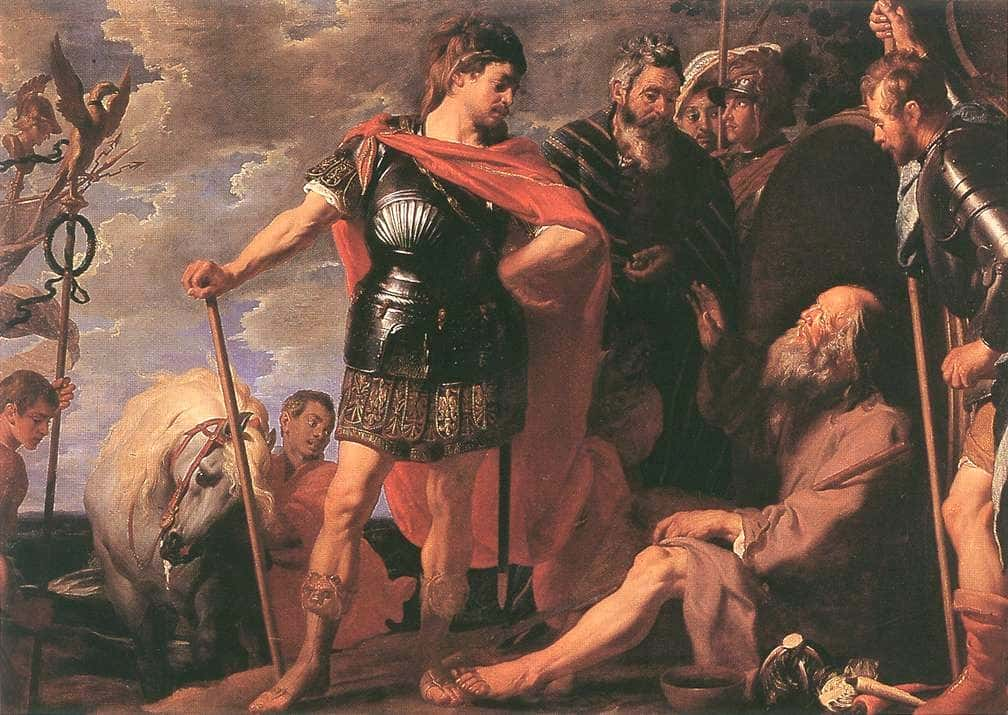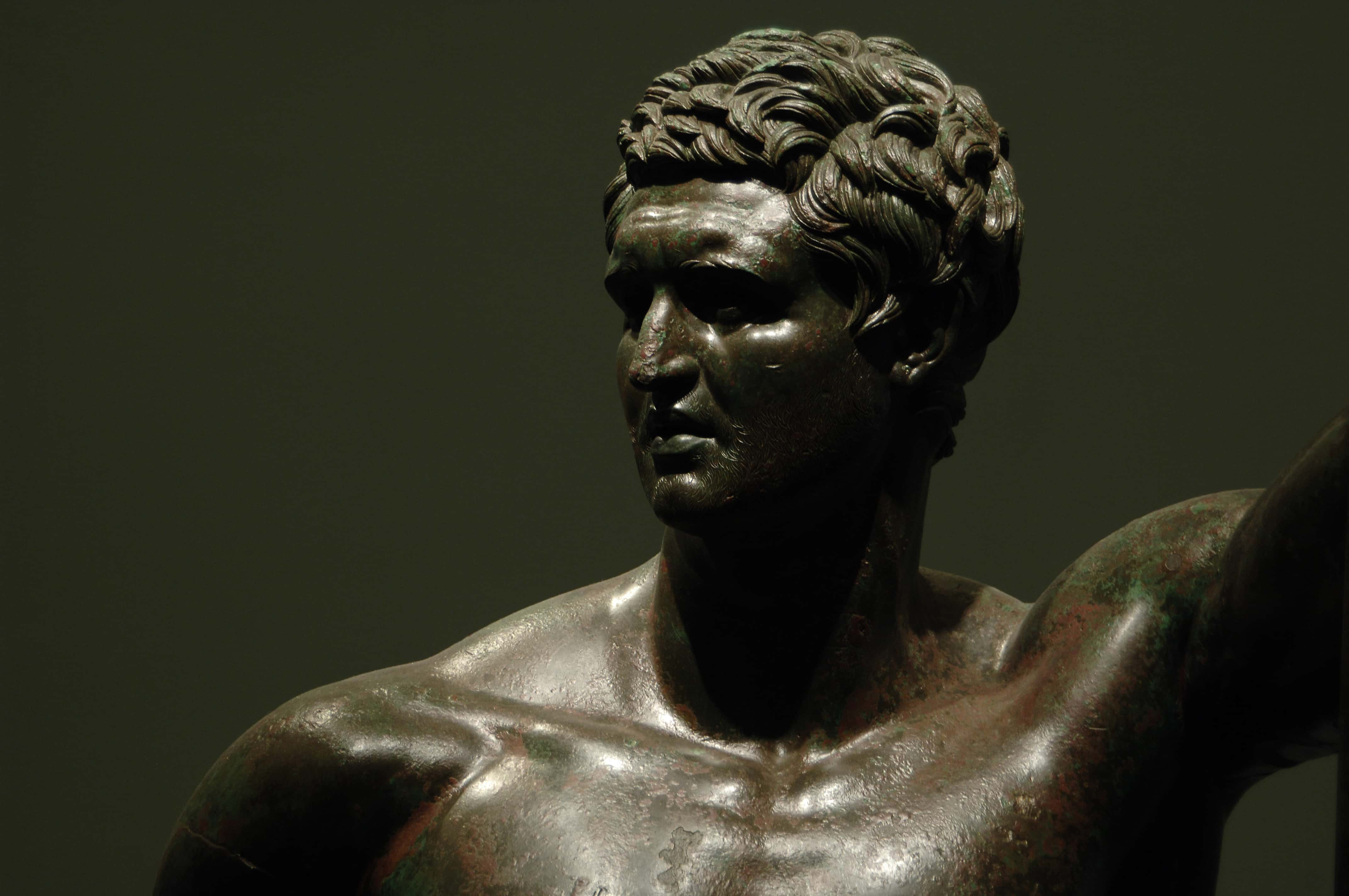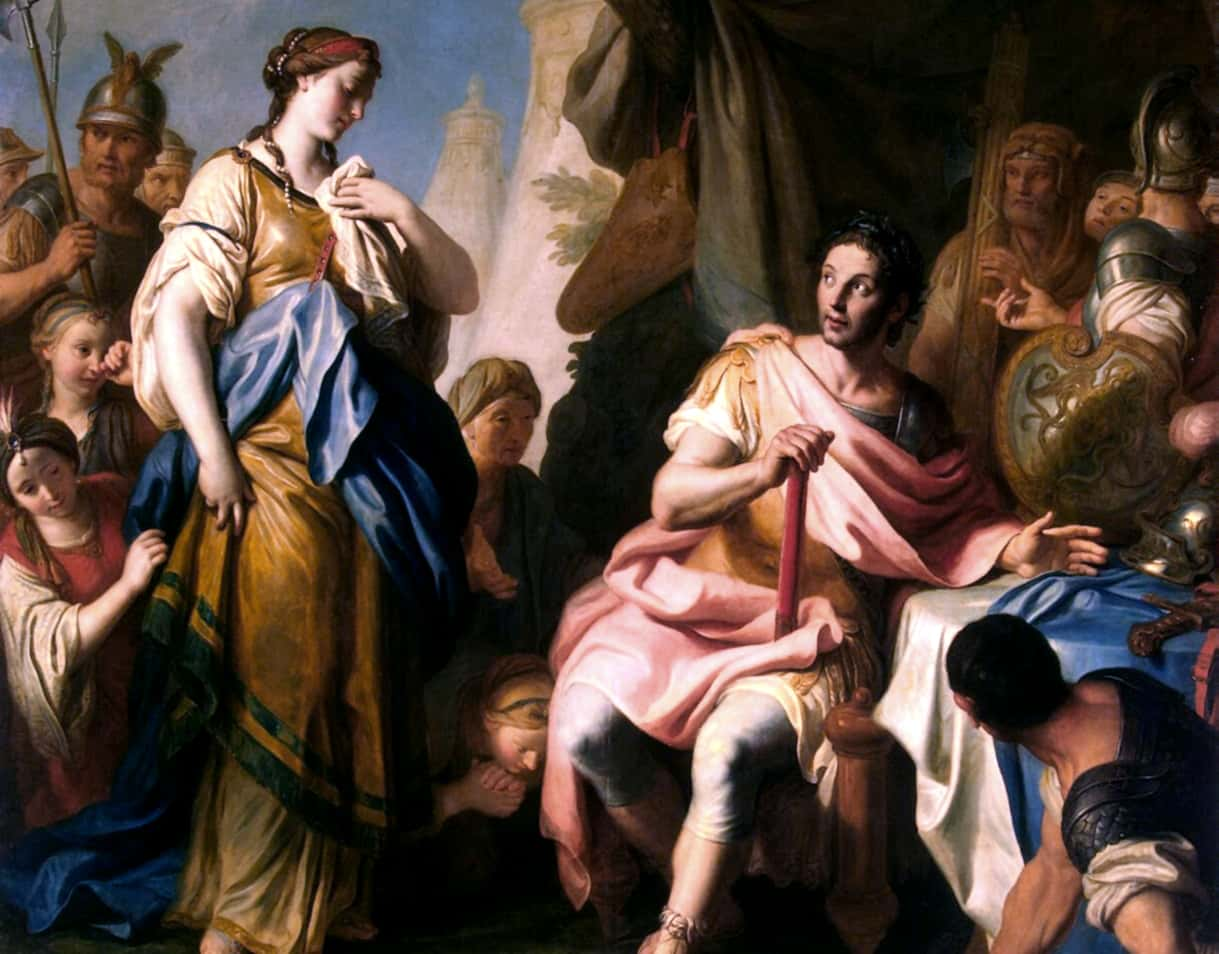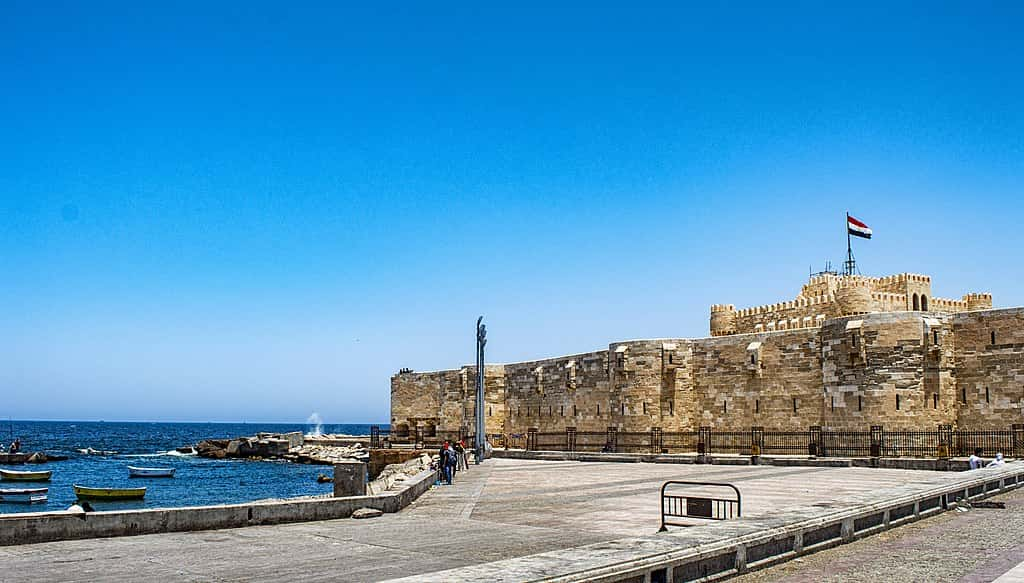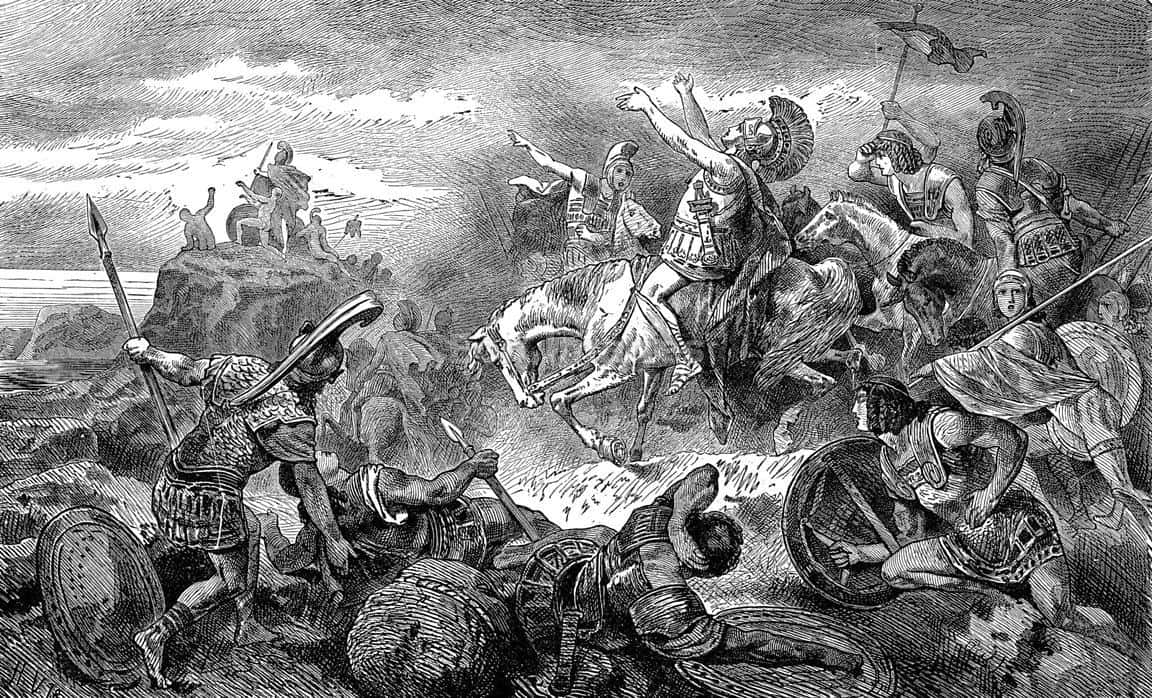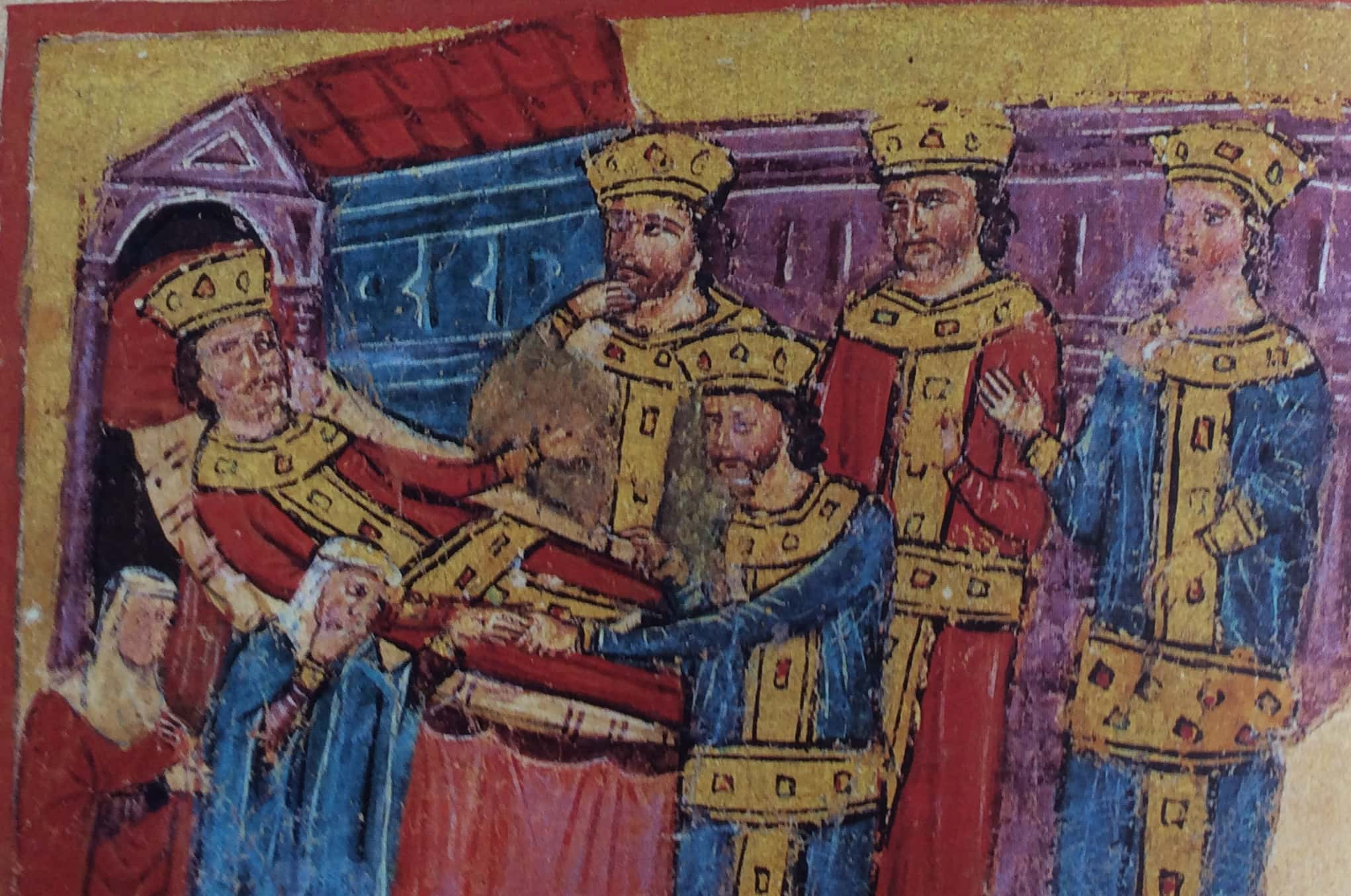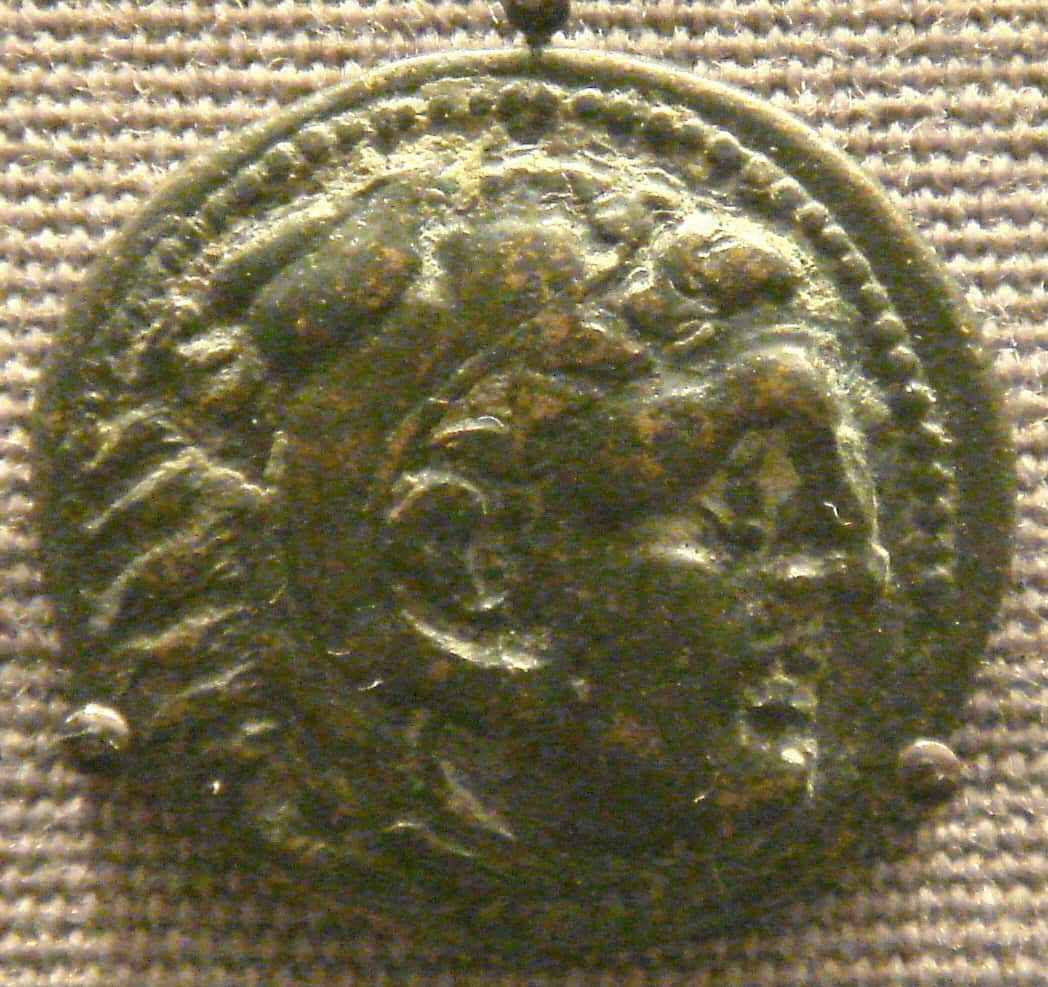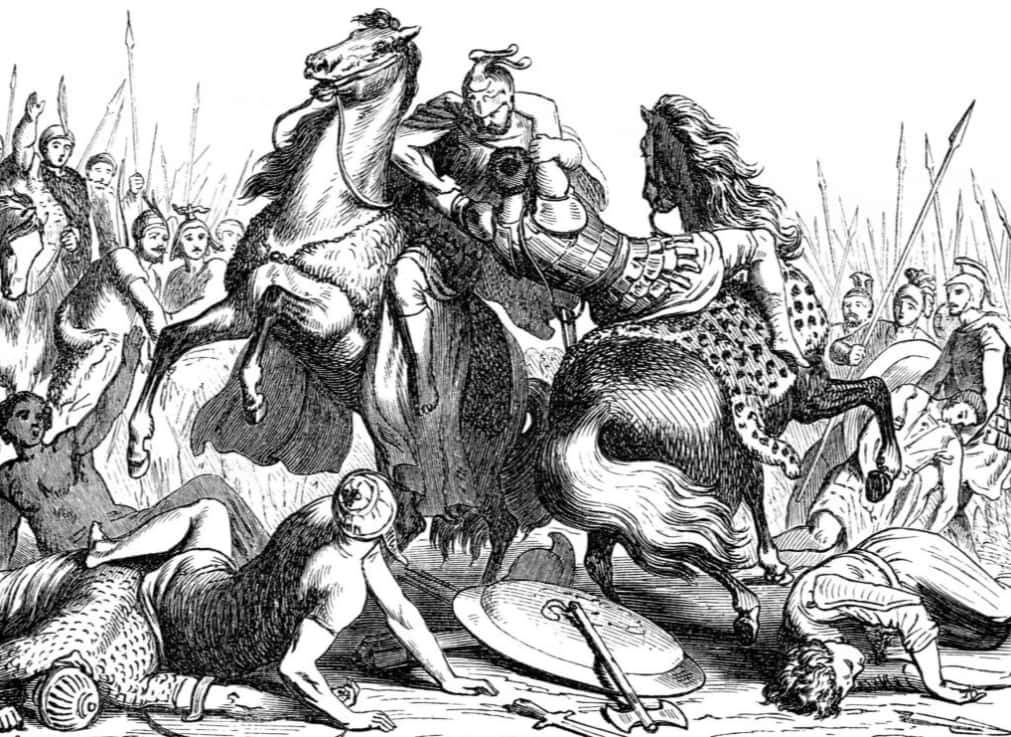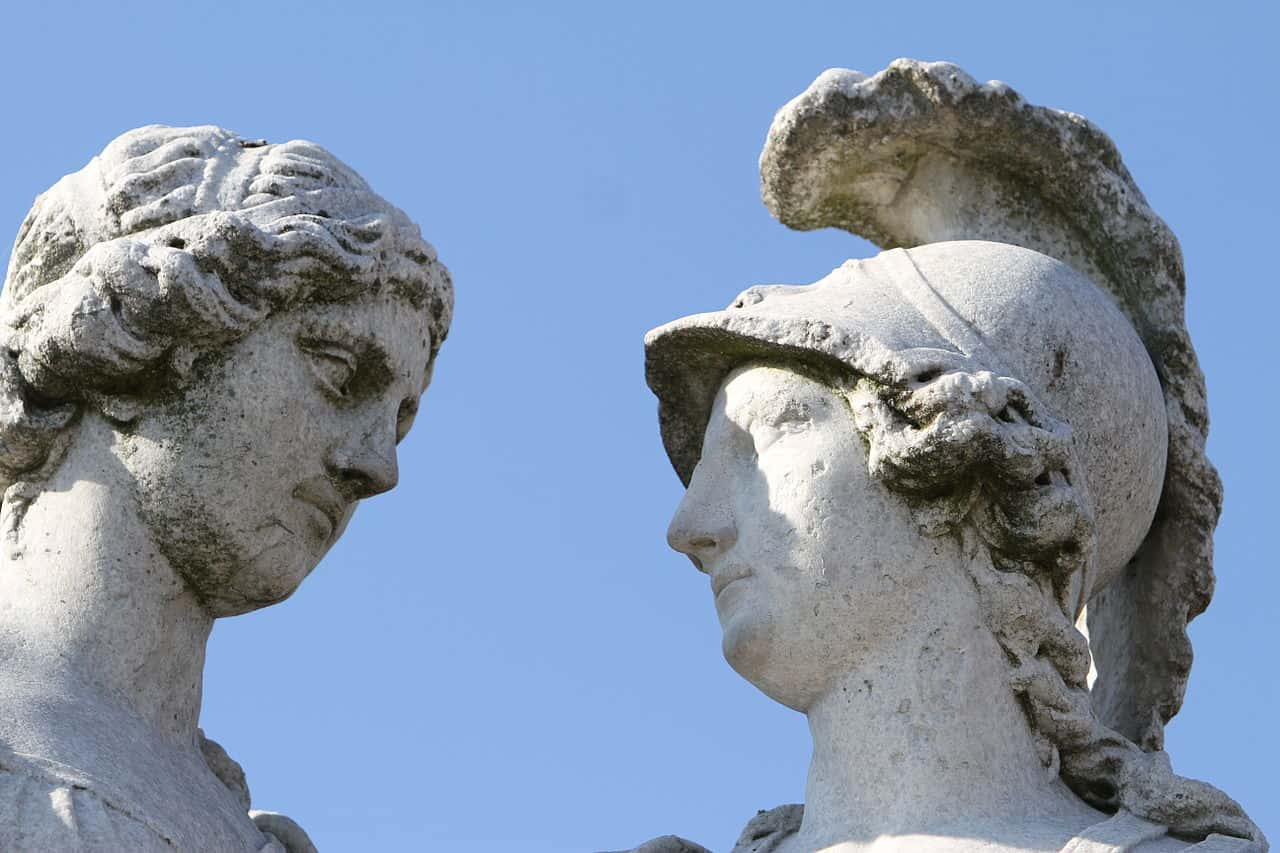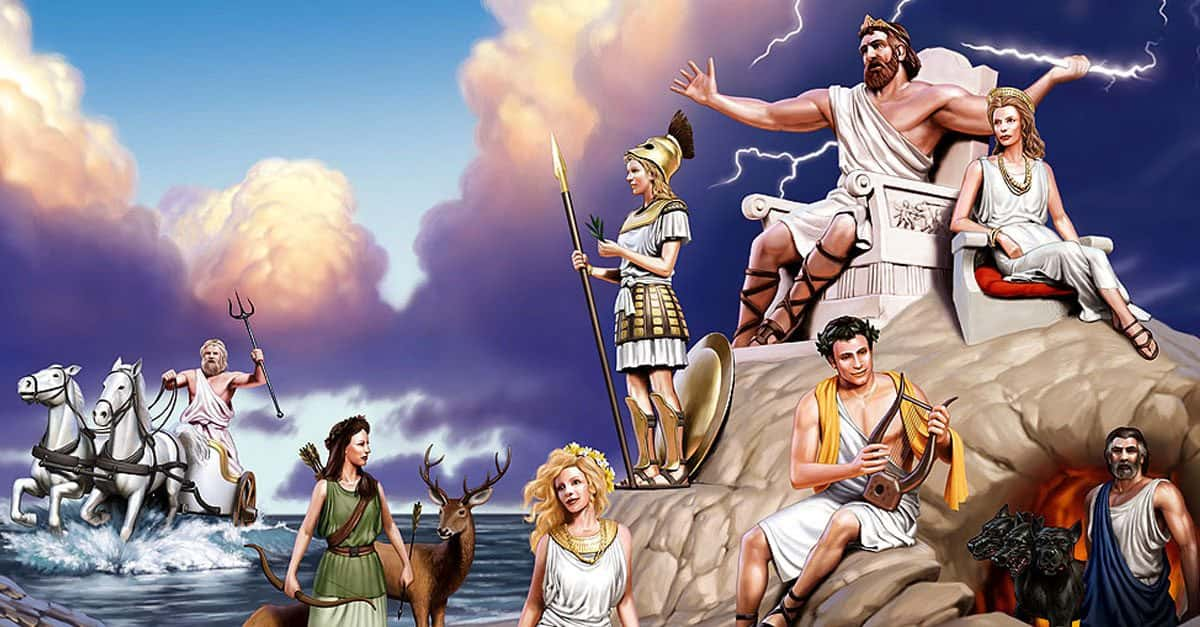41. The Phalanx Army
One of Alexander the Great’s favorite tactics was the use of the Macedonian phalanx. A phalanx is a strategic formation that consists of a block of infantry standing shoulder to shoulder in rows that are several feet deep. The Greek formation was modified by Alexander’s father Philip II and utilized by Alexander in battle. What set the Phalangites apart was the fact that they were professional soldiers, and were among the first to be trained through drills. These soldiers were each armed with a 20-foot-long pike called a sarissa and were instrumental in holding off the Persians while Alexander’s cavalry stormed their ranks.
40. Lineage
Alexander’s mother was also of royal blood. Olympias, as she was eventually called, was the daughter of King Neoptolemus I of Epirus, and her family claimed to descend from both the mythical Greek King Aeacus, and from the Greek Hero of the Trojan War, Achilles.
 Alexander (2004), Warner Bros.
Alexander (2004), Warner Bros.
39. Both Sides of the Blanket
Throughout history, there have been many questions about Alexander’s sexuality. Despite having three wives, he was also rumored to have had sexual relations with at least one man. This didn't necessariliy make Alexander gay, however. At least not how we think of it today. For the Ancient Greeks, gender wasn’t a factor in choice of sexual partner and was seen as personal taste. Men often had sex with other men or teenaged boys, and also still had sex with women or took wives. In Alexander’s case, since both his wife and his concubine bore him children, he was most likely bisexual in modern terms.
 Alexander (2004), Warner Bros.
Alexander (2004), Warner Bros.
38. Philosophical Education
At age 13, Alexander was tutored by the great philosopher Aristotle. His tutelage lasted for about 3 years, and Aristotle taught him government, philosophy, politics, poetry, drama, and sciences.
 Alexander (2004), Warner Bros.
Alexander (2004), Warner Bros.
37. Good News/Bad News
On the date of Alexander’s birth, King Philip was greeted with some good news. His general Parmenion had defeated the Illyrian and Paeonian armies, and his horses won at the Olympic Games. In a bad news situation, also on the date of his birth, the Temple of Artemis, one of the seven wonders of the world, burnt down.
36. A Man and His Horse
When Alexander was ten years old, he was brought a horse by a trader from Thessaly. The horse proved impossible to tame, and his father ordered it sent away. Alexander noticed that the horse was afraid of its shadow and pleaded for permission to tame the horse. Much to the joy of Philip, he did. As a reward for his courage and ambition, Philip bought him the horse which he named Bucephalas or “Ox Head.” When the horse died in battle at the ripe old age of 30, Alexander named the city Bucephala after him.
 Alexander (2004), Warner Bros.
Alexander (2004), Warner Bros.
35. A Pleasant Odor
In historian Plutarch’s book Lives of the Noble Greeks and Romans, Plutarch reported that Alexander possessed a “most agreeable odor,” and that his breath and body perfumed his clothes. This reference to smell was part of a tradition of giving otherworldly characteristics to a conquering king.
 Alexander (2004), Warner Bros.
Alexander (2004), Warner Bros.
34. Alexandropolis
When Alexander was just 16, King Philip instigated a war against the Byzantion, and as both heir apparent and Prince Regent, Alexander was left in charge. In Philip’s absence, Alexander defended Macedonia against a revolt by the Thracian Maedi and drove them from their territory. He settled the area with Greeks and named the city Alexandropolis.
33. The Roman Connection
Greek Culture is said to have had a tremendous influence on Rome. There are numerous similarities in their myths and their artwork, and Caesar trained his armies in the Spartan way. Caesar and his nephew Augustus greatly admired Alexander the Great, and whenever they stayed in Alexandria, they would visit his tomb to pay their respects.

History's most fascinating stories and darkest secrets, delivered to your inbox daily.
32. Undoing the Knot
In a legend similar to Arthur and Excalibur, a Greek oracle foretold that whoever was able to untie the knot of Gordium would go on to become the true ruler of Asia. When Alexander reached the town of Gordium on his Asian campaign, he decided to attempt the knot. He initially tried to untangle the knot, but when his patience ran out, he simply took his sword and sliced through it.
31. You’re Blocking My Sun
A popular story about Alexander pertains to a possible meeting between him and the philosopher Diogenes the Cynic. As the legend goes, Alexander sought out Diogenes, who was known for his rejection of social norms and allegedly slept in a large clay jar. He approached Diogenes in a public square, and asked if there was anything that he, Alexander, could do for him with his riches. Diogenes supposedly replied, “stand aside; you’re blocking my sun.” Alexander was so amused by his blunt response that he reportedly told his generals “If I were not Alexander, I would be Diogenes.”
30. Exile
When Alexander’s father fell in love with and married his general’s niece, Cleopatra, Alexander’s place as heir was threatened. Alexander was only half Macedonian, but any child produced by Cleopatra would be fully Macedonian, and potentially have a stronger claim to the throne. After a falling out with his father at the wedding banquet in which Alexander was nearly stabbed to death, Alexander and his mother fled to Macedonia. With help from a family friend Demaratus, Alexander was able to return home six months later.
29. Do Like the Persians
After conquering the Persians, Alexander realized that acting like a Persian would be the best way to keep control of his conquest. He began wearing the traditional dress of a Persian royal, and in 324 held a mass wedding where he forced 92 Macedonian leaders to marry Persian women. Alexander also married two Persian women, Stateira and Parysatis.
 Alexander (2004), Warner Bros.
Alexander (2004), Warner Bros.
28. A Sweet Preservation
Like many details of his death, how Alexander’s body was preserved during the time before his transfer to Egypt is one of speculation, but in 1889, E.A. Wallis Badge put forth the idea that he was preserved in a vat of honey. Honey is known to have a preserving effect, and it was a practice often used in ancient cultures to embalm bodies. The honey in Alexander’s coffin would have prevented the body from decomposing during the long journey to Egypt.
 Alexander (2004), Warner Bros.
Alexander (2004), Warner Bros.
27. Love at First Sight
According to some historical reports, Roxanne, Alexander the Great’s first wife, was possibly the only woman he ever loved. There are different versions of their meeting. In one account, he came across Roxanne among Bactrian captives after their surrender, and he immediately fell in love. In historian Plutarch’s version, he first sees her among the dancers at a banquet held in in his honor immediately after Bactria’s surrender.
26. Political Unification
While it is generally agreed that Alexander did in fact love Roxanne, it is also believed that he married her in order to unite Greek and Persian cultures. Marriages of that nature were something that Alexander’s father was known to do, and it stands to reason that Alexander would do the same.
25. Founder of Cities
As a means of recognizing his numerous conquests, Alexander would found cities around his military forts and name them Alexandria. All in all, there were more than 70 cities named Alexandria, the most famous of which is Alexandria in Egypt. Alexandria was founded at the mouth of the Nile river in 331 BC and is the second largest city in Egypt today.
24. They Don’t Match
Alexander the Great had an eye condition called heterochromia iridium which means he had two different colored eyes. It’s caused by a lack of pigmentation in the iris of one of the eyes. The condition is more common in animals such as dogs and cats, but several celebrities like Kiefer Sutherland, Kate Bosworth and Mila Kunis have it.
 Alexander (2004), Warner Bros.
Alexander (2004), Warner Bros.
23. Inspired by Homer
Alexander the Great was said to be extremely fond of Homer’s Iliad and kept a copy with him all of the time. The book was a gift from his tutor Aristotle, and he read the work on a regular basis. When Aristotle saw that Alexander was inspired by the epic poem, he created an abridged version for him to take with him on military campaigns.
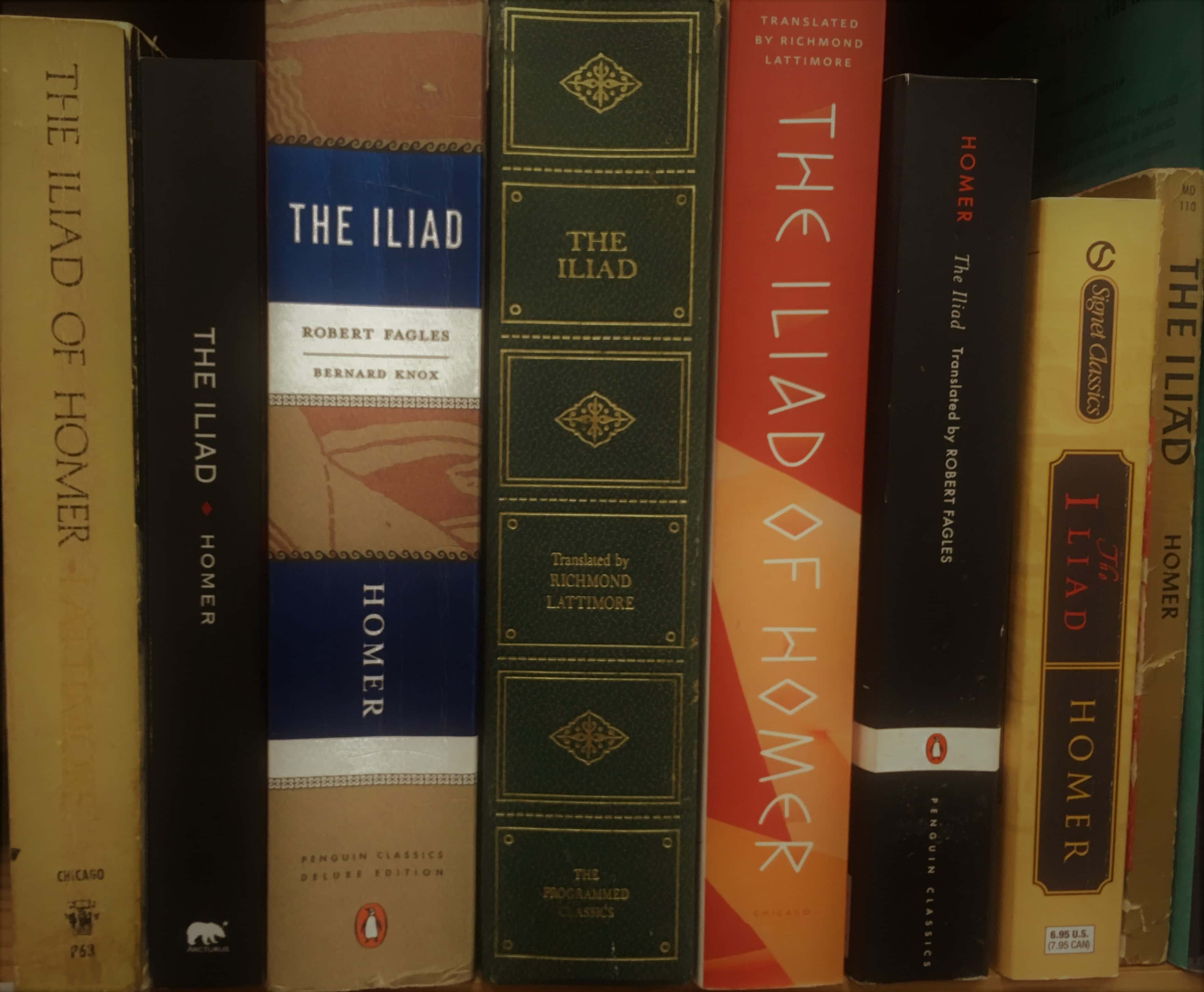 Wikimedia Commons, Pete unseth
Wikimedia Commons, Pete unseth
22. Fighting for Independence
Alexander’s position as King of Macedonia didn’t automatically grant him absolute control of the Corinthian League that his father had founded in Greece. Athens wanted to rule the league, and several other Greek States launched rebellions. Alexander led his army south and forced Thessaly to recognize him as leader. By fall of 336, he had secured treaties from all of the Greek city-states in the league and was given full military power to conquer Persia.
21. You Can Do Better
About a year after Alexander’s return from exile, he got word that the Persian governor was offering his daughter in marriage to his half-brother Philip Arrhidaeus. This, according to his mother and some of his friends, was another sign of the King’s intent to pass him over as heir, so Alexander took action. He sent an actor to meet with the governor and tell him that he shouldn’t marry his daughter to an illegitimate son and should marry Alexander instead. When his father heard of this he ended negotiations, telling Alexander that she wasn’t a good enough bride for him. Philip also banned four of Alexander’s friends, and had the actor delivered to him in chains.
 Alexander (2004), Warner Bros.
Alexander (2004), Warner Bros.
20. Securing the Borders
Before embarking on his Persian Campaign, Alexander set out to secure his Northern borders. In Spring of 335, he took steps to squash the revolts and marched East into the country of the Independent Thracians. He handily defeated the forces at Mount Haemus and took control. Next they marched into Triballi, and defeated the army there. Finally, he marched for three days into the Danube, and after crossing the river at night in a surprise attack, forced the Getae tribe to retreat after their first battle. After getting word that the Kings of Illyria, and the Taulantii were openly rebelling against him, Alexander defeated them as well, and forced them to flee. With this, he was able to safeguard his Northern Borders.
19. Man of Many Names
Alexander the Great was known by a number of other nicknames in his lifetime. He was often called the Accursed, the Conqueror of the World, the Philosopher-King, and the Madman of Macedonia among others.
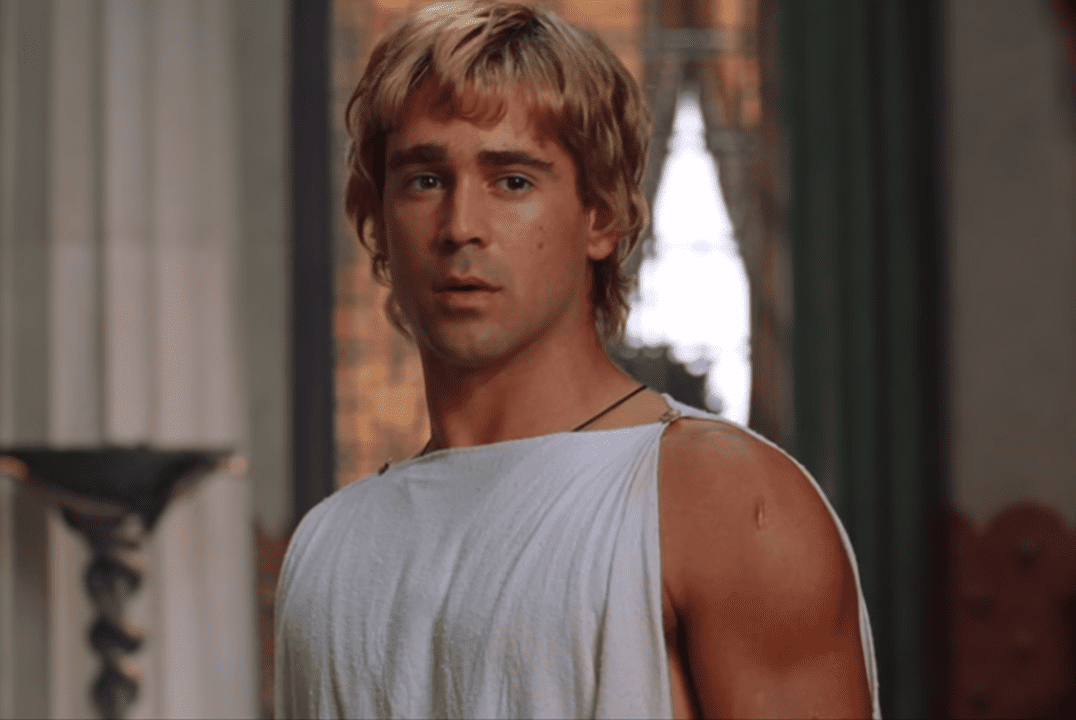 Alexander (2004), Warner Bros.
Alexander (2004), Warner Bros.
18. Conquering Persia
Once he finished taking care of his housekeeping at home, Alexander left the General Antipater in charge as regent and set out for Persia. He easily won the first battles at the Granicus River and Sardes, but met with challenges in the cities of Miletus, Mylasa and Halicarnassus. In 333 BC, Alexander’s army met the Persian King’s massive army near Issus in Turkey. Despite being outnumbered in men, his experience and determination were unmatched by the King’s army, and King Darius was forced to flee with his troops leaving his family behind. Darius’ mother was so angry, she reportedly disowned her son and adopted Alexander instead.
 Alexander (2004), Warner Bros.
Alexander (2004), Warner Bros.
17. Rejecting Peace
When Alexander and his forces took over the Phoenician cities of Marathus and Aradus (The coastline of modern day Lebanon, Northern Israel, Syria and Southwest Turkey), Darius begged Alexander for peace, but he refused. He attacked the island of Tyre, but having no Navy, he needed to find another way to get in. He had his men build a causeway to reach Tyre, but they repeatedly foiled his attempts to break their defences. Finally, Alexander realized that he would need his own navy, and gathered a large fleet. In 332 BC, he broke through the city walls, and had those who defied him either executed or sold as slaves.
 Alexander (2004), Warner Bros.
Alexander (2004), Warner Bros.
16. A Dictator’s Obsession
Former Cuban leader Fidel Castro was a great admirer of Alexander the Great’s military accomplishments and adopted the name Alejandro in tribute to him during the revolution of the 1950s.
15. Blending of Cultures
Alexander’s Persian conquests eventually led to the spread of Greek culture into the Persian nations (Pakistan, Afghanistan, and India), and to the establishment of Greco-Buddhism, which is the blending of Buddhism with Greek culture.
 Alexander (2004), Warner Bros.
Alexander (2004), Warner Bros.
14. Son of Zeus
Heracles, or Hercules, was one of Alexander’s greatest idols and influences. He so revered the mythical figure that he took to calling himself the Son of Zeus, just as Heracles did, and bragged that he was descended from the demigod on his father’s side of the family.
 Hercules (1997), Walt Disney Pictures
Hercules (1997), Walt Disney Pictures
13. There’s Always Time for Philosophy
Alexander the Great had a great love for philosophy. He apparently loved it so much, that he briefly paused his military campaign in India to have philosophical discussions with the gymnosophists, or “naked philosophers.” (So called because of their rejection of human vanity and clothing).
 Alexander (2004), Warner Bros.
Alexander (2004), Warner Bros.
12. Hair Dye Rarer than Diamonds
Alexander the Great used to wash his hair with saffron to keep it gleaming and orange. Dying their hair, eyebrows and facial hair was a common practice for the Ancient Greeks, but at the time, saffron was extremely rare and more expensive than gold.
 Alexander (2004), Warner Bros.
Alexander (2004), Warner Bros.
11. Undefeated
From his first battle at age 18 until his death, Alexander was undefeated in battle. He had a reputation for leading his men with great speed, which allowed the smaller forces to reach and break enemy lines before his opponents were ready. In 334 BC Alexander fortified his own kingdom in Greece, and then crossed into Asia, where he won several more battles. His tactics are still studied in military colleges today.
 Alexander (2004), Warner Bros.
Alexander (2004), Warner Bros.
10. Greatest Greek of All Time
A 2008 TV show called “The Greatest Greeks” asked the audience to vote on who they considered the greatest Greek of all time. The winner was Alexander the Great, further illustrating his long-enduring impact and influence on modern society.
 Alexander the Great (1956), United Artists
Alexander the Great (1956), United Artists
9. Political Maneuvering
At the Council of State held following Alexander’s death, the generals decided to split the empire between Alexander’s mentally-challenged half-brother and Roxana’s child, if it was a boy. The boy was to be placed under the regency of the powerful general Perdiccas until he was old enough to rule, but Perdiccas had different plans. In an attempt to strengthen his own position as ruler, he married Alexander’s sister Cleopatra, which led to war with another of Alexander’s generals Antipater and his ally Ptolemy. Before Perdiccas could battle Ptolemy, he was assassinated at the hands of his own soldiers, and Antipater declared himself super regent of the empire. This began a series of wars between the generals known as the wars of the Diadochi, in which they all made a grab for power and land.
8. End of the Line
When Antipater died in 319 BC, Polyperchon, another powerful general succeeded him. Antipater’s son Cassander had no intention of letting this stand, and began a war with Polperchon, forcing him to flee to Epirus and join Olympia, Roxana, and Alexander’s son. Cassander captured Olympia in Pydna, and in 316 BC, had her put to death for the crimes she was accused of. He also captured Roxana and Alexander IV and had them both put to death. Their deaths officially ended Alexander’s line, but for good measure, he also murdered Heracles and his mother.
7. Final Wishes
Before his death, Alexander left detailed instructions with Craterus for a few things. The first was military expansion into the southern and western Mediterranean. Then there were plans for the construction of an enormous tomb for his father which would match the Egyptian pyramids, as well as the construction of great temples across India and Greece, and the circumnavigation of Africa. The final instructions were for a greater mixing of European and Asian populations to create a “common unity” in what was at the time, one large continent. Caterus started to carry out his wishes, but Alexander’s successors elected not to continue, stating that they were wasteful and unrealistic.
6. An Enduring Mystery
The exact location of Alexander the Great’s tomb is a mystery even today. Upon his death, possession of his body was a subject of negotiation amongst his generals, each favoring a different location. According to the Parian Chronicle (a Greek chronicle inscribed on a tall stone or wooden slab similar to a tombstone), Alexander was buried in Memphis in Egypt, but in the late 3rd or 4th century, his body was transferred to Alexandria.
 Alexander (2004), Warner Bros.
Alexander (2004), Warner Bros.
5. Cause of Death Unknown
To this day, the exact cause of Alexander’s death is unknown. In 323 BC, he became ill after drinking a bowl of wine at a party and two weeks later he died. Due to the nature of his father’s death, the people surrounding Alexander became immediate suspects. As best as modern science can discern, the most likely causes of death could have been malaria, lung infection, typhoid fever, or liver failure might have killed him.
 Alexander (2004), Warner Bros.
Alexander (2004), Warner Bros.
4. Up for Grabs
When King Philip was assassinated in 336 BC, some circles suspected that Alexander and his mother had a hand in his stabbing. With the throne now free for the taking, Alexander quickly eliminated any enemies who stood in his path. With help from the Macedonian army, he murdered all other potential heirs to the throne. His mother Olympia helped Alexander’s quest by killing King Philip’s daughter and leading his wife Cleopatra to commit suicide.
3. Divine Prophecy
Calanus, who was one of the Indian philosophers with whom Alexander met in Taxlia (North Pakistan), decided to follow Alexander. When he became ill in Persies (Southwest Iran), he told Alexander that he planned to commit suicide by self-immolation (setting himself on fire). As he entered the fire, he allegedly gave a farewell salutation to all but Alexander, telling him that when they met again in Babylon, he would salute him then. Calanus’ words were basically ignored at the time, but when Alexander later died in Babylon, they were seen as a divine prophecy of his death.
 Alexander (2004), Warner Bros.
Alexander (2004), Warner Bros.
2. The Sport of Drinking
After the death of Calanus, Alexander decided to organize an Olympics in India to honor him. Not being familiar with Greek sport, Alexander changed his plans, and created a wine-drinking contest instead. Unfortunately for the contestants, none of them were used to drinking alcohol, and all 41 of them died on the spot. The winner, a Greek soldier by the name of Promachus drank the equivalent of 13 litres of wine and died of alcohol poisoning a few days later.
 Alexander (2004), Warner Bros.
Alexander (2004), Warner Bros.
1. What did He Say?
Because Alexander’s legitimate child hadn’t been born yet at the time of his death (his other son’s mother was a concubine) there was no clear successor. On his deathbed, his generals reportedly asked Alexander to whom he would leave his kingdom, and there is some debate as to what he said. Some think he said “Kratisto,” which means “to the strongest” in Greek, but others thought he said “Krater'oi” meaning to Craterus, who was the commander of his army. Craterus, however, was not present at Alexander’s deathbed, and as Alexander’s meaning was unclear, he was not selected as ruler.
 Alexander (2004), Warner Bros.
Alexander (2004), Warner Bros.
Sources: 1, 2, 3, 4, 5, 6, 7, 8, 9, 10, 11, 12, 13, 14, 15, 16, 17, 18, 19, 20, 21, 22, 23

